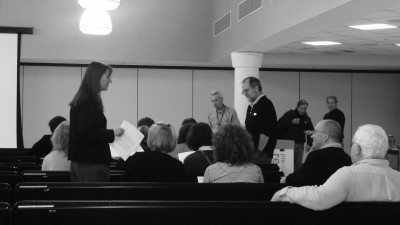Caitlyn Rand ’13 & Claire O’Halloran ’13
Web Opinions Editor

Some teachers are distressed by a letter Superintendent Elliott Landon sent at the end of the last summer.
The letter was sent to teachers who had accumulated, in the 2009-2010 school year, absences above the district average of 8.5 missed school days.
Though teachers are taking less than the allotted number of sick days, Landon feels it is important for teachers to “be present for their students every day of the school year.”
Landon’s letter makes teachers reiterate their want to be treated like “professional adults,” said a source granted anonymity due to the sensitivity of the topic.
The letter, which came from Landon’s office, indicated that it was not distributed to “make a judgment as to the legitimacy of these absences,” but rather to merely inform teachers that they were over the district average.
According to the most recent teachers’ contract, teachers are granted 15 or more sick days a year plus additional days for personal matters, such as personal days, funerals, and religious observances.
What has the teachers upset is that a letter was sent to any teacher with over 8.5 absences, a number less than what they’re allowed by contract.
A Westport Education Association (WEA) email was sent to all WEA colleagues after the attendance letters were distributed to inform them that over 150 teachers received letters, so if they received a letter, they were not alone. The WEA is the local teachers’ union that represents issues teachers have with their working conditions. The email was provided by the anonymous teacher.
The letter surprised Caroline James, a math teacher. She and other teachers thought the decision was made two years ago to not send the letters anymore because the response to them had been negative. Consequently, teachers were surprised that this letter was sent.
The WEA is now working to settle the issue currently at hand “to make sure teachers and administration are on the same page,” said Jesse Bauks, an English teacher and WEA representative.
The reactions to the letters have been diverse: some people strongly agree with Landon’s decision, some are strongly opposed, and many others have chosen to stay neutral.
Donald O’Day, Chairman of the Board of Education (BOE), said the letters were beneficial because they help the administration see if they have made any errors in the number of absences a teacher has; the letters give teachers a chance to contact the BOE if the number of absences printed on the letter was incorrect.
“I fully support the efforts of the superintendent to provide teachers with crucial information about their classroom and the success of their students,” O’Day said.
On the other hand, the anonymous teacher said that all that was achieved from the letter was the “humiliation, insult, and intimidation” felt by teachers who are “actually sick or [have] urgent matters to attend to.”
The source said the letter would have no effect on those taking advantage of their sick days because “people who abuse the system will continue to.”
In the anonymous source’s opinion, the letters only had a negative impact, upsetting the morale of teachers who care and making them feel “alienated.” The source said he or she does not understand the purpose of the letter and said that its future distribution should be reconsidered.
“We know we are responsible for our children to reach the benchmark,” the anonymous source said. “We try to do it, we work hard to do it. We have to get our work done. It makes you question putting in extra effort.”
O’Day said that he “hope[s] that a simple presentation of facts would not adversely affect morale.”
“I think Staples teachers as a whole take their jobs so seriously and professionally, so I don’t question colleagues if they take a sick day,” said Jennifer Guidice, a math teacher. “Any teacher would rather be here teaching than home sick writing substitute plans.”
It is hard to send one generic letter because each teacher has a different story and such a letter will never apply to everyone, Giudice said. She believes that it would be best to talk to the teachers personally, although it is impractical.
“Teachers are human beings, and, like the rest of the population, we get sick from time to time,” James said. “We can’t plan our sickness around the predetermined vacation days, and [we] have the right to stay home if we are sick. I feel that we teachers are actually more likely to get sick than many others as we are exposed to so many germs from our daily contact with so many students.”
James said she usually attends school on days she feels sick for the sake of her students, not to prevent accumulating absences.
Not only were sick days accounted for in the total number of absences, but also personal days and emergency leave days, Bauks said.
“The letters were sent only to those teachers whose absences exceeded the average days of absence for all teachers,” Landon said in an email interview.
Many research studies have shown that the numbers of teacher absences adversely affect the academic success of their students, he said.
Though some teachers are upset, many found it difficult to decide on a number of sick days they felt was appropriate.
It’s “completely believable” that an “outstanding” teacher could have a year where extenuating circumstances create more absences than usual, James said.
“I don’t know what the magic number of absences is for it to be a concern,” James said. “The issue should be the level of instruction students are receiving.”
Principal John Dodig, WEA leader Kathy Sharp did not wish to comment on the letters because of the sensitivity of the issue.













































